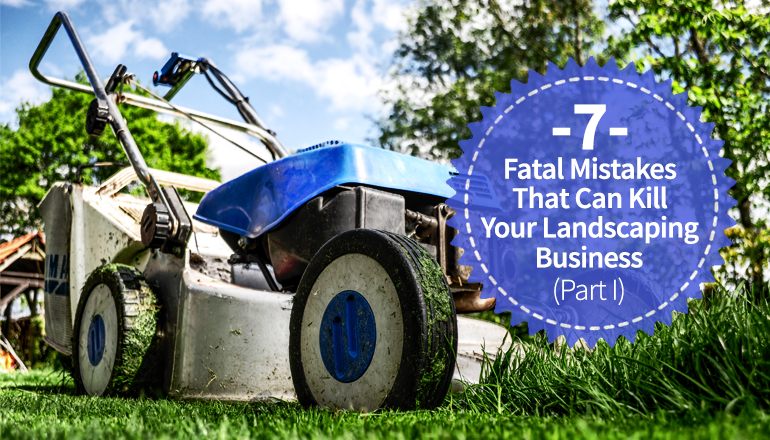Owning a business in the overcrowded landscaping industry is not for the faint of heart. You need persistence, determination, and a strong mind to withstand the day in, day out work.
But, here’s the thing: although passion is paramount, you also need a roadmap that can help you identify the best course for success and warn you about the mistakes that can kill your business early on.
Click here to continue to Part II! —>
With that in mind, here are the errors landscapers should avoid if they want to succeed in this industry.
1. You Don’t Have Enough Capital to Sustain Your Business
You’re probably familiar with the success stories: people who have built profitable businesses from their garages with little to no investment capital. Most of these stories don’t mention the hurdles entrepreneurs had to jump to keep their companies afloat in the first years.
Sure, you can start a business with very little money, but that’s not always advisable—especially in the landscaping industry where you need professional equipment and adequate cash flow to deliver your projects.
Develop a business plan before taking the plunge and launch (or re-launch) your landscaping company. Figure out how much money you need to get started and maintain a positive cash flow. Most landscapers need around 20% of their gross annual revenue to support their business. Look for funding options, like a small business loan or a line of credit, if you don’t want to risk your personal savings to launch your business.
2. You Don’t Have a System That Enables Business Growth
As soon as they launch their business (or sometimes even before that), some landscapers start to think about the steps they can take to grow. They plan creative marketing campaigns, think about how they can perfect their services, and develop pricing strategies. While all these are vital to building a healthy business, you also need to focus on building a system that allows your business to run without you.
When you’re just starting out, you’ll wear most of the hats in your company, from accounting to marketing and design. But, as your business grows and you start hiring people, you’ll transition from being hands-on to delegating tasks. This transition will be easier if you have a system in place that captures the know-how of your business.
Start documenting your process from day one. Take notes on everything, from the way files are saved to how big decisions are made. That way, when your employees don’t know how to do something, they can refer to the operations manual instead of bugging you with every little question they have.
3. You’re Growing Too Fast
Business growth is like a two-edged sword. Grow too slow, and you risk burning through your cash before you reach your break-even point. Grow too fast, and you’ll run into a new set of challenges that can be fatal for your landscaping business.
Growth becomes a problem when you’re not longer able to keep up with your business’ expansion. When you’re a small business, you have a pretty good understanding of your numbers and can watch your cash flow. But, if you’re growing too fast, you’ll have a difficult time securing suppliers and fulfilling contracts. And, if you can’t handle contracts, you could alienate your prospects and hurt your business’ long-term success.
Set realistic goals and figure out the optimal rate at which you should grow your business. Although it might sound odd, there is such a thing as growing too fast.
4. Not Identifying High-Performing Employees
Your employees are one of your biggest assets. While you can launch your business as a one-person show, you can’t take it to the next level of success without the right people. That’s why you need to identify the superstars in your company early on and do whatever you can to keep them by your side.
Focus on creating a company environment that fosters growth and innovation from the early stages of your business. Otherwise, instead of dedicated and passionate employees, you risk surrounding yourself with people who only care about getting their paycheck at the end of the week.
Don’t neglect your under-performing employees, though. Try to determine the reasons behind their lack of motivation and look for ways to inspire them and help them improve their skill sets.
Conclusion
Sometimes mistakes are inevitable. And, that’s ok as long as you’re using the lessons you’ve learned to grow your business. Most errors, however, can be avoided. We’ll learn more about them in the second part of our article.






